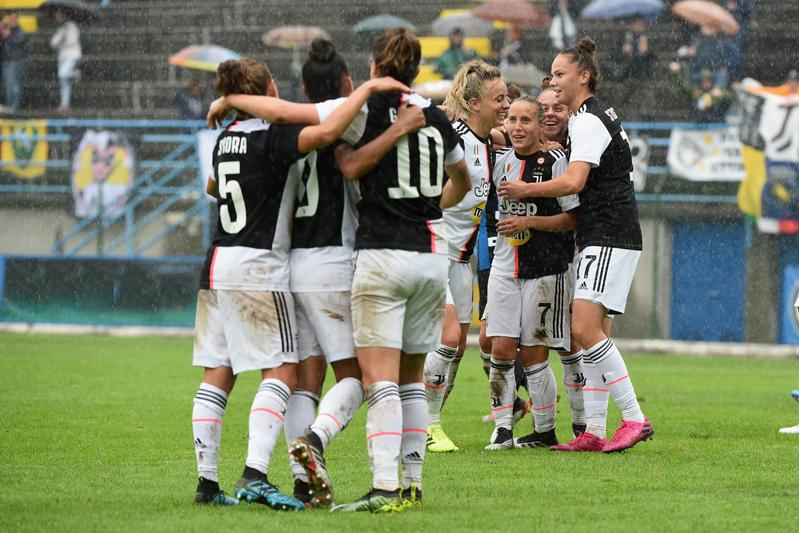PHOTO
In today’s meeting, the Federal Council decided upon the rankings of the national women’s competitions, assigning the Italian Championship to Juventus, as well as defining a series of rules for the coming season, including the expansion of Serie B to 14 teams and Serie A’s path to professional status in 2022. Among other decisions, the final 2019 table was unanimously approved.
President Gabriele Gravina opened the meeting at 11:00 CEST, with the 30 council members present: Dal Pino, Marotta and Lotito for Lega A; Balata for Lega B; Ghirelli, Baumgartner and Lo Monaco for Lega Pro; Sibilia, Acciardi, Baretti, Frascà, Franchi and Montemurro for the National Amateur League; Tommasi, Calcagno, Gama and Zambrotta for the athletes; Beretta and Giatras for the coaches; AIA president, Nicchi; the Youth and School Sector president, Tisci; the Technical Sector president, Albertini; the general secretary, Brunelli; the president of the Women’s Football Division, Mantovani; UEFA vice president, Uva; the UEFA member on the FIFA board, Christillin; ECA president and UEFA Executive Committee Member, Agnelli. The President of AIAC, Ulivieri, was invited as an auditor. All the board members tuned into a conference call, except for Gravina, Lotito, Ghirelli, Sibilia and Tommasi who were present at the venue in person.
The FIGC’s President opened the meeting by observing a moment of recollection for the passing of two Italian football champions, Mario Corso and Pierino Prati, as well the tragic death of Arianna Varone, Riozzese’s promising young star in the women’s Serie B division. Gravina also updated the Council on the inspections being carried out by the team from the Federal Prosecutor’s Office at professional clubs to verify the correct implementation of the health protocols.
Women’s Serie A and Serie B championships, and development strategies for the coming seasons
The Federal Council, having established the final league table through the use of the coefficient discussed in their last meeting, decided upon assigning the Women’s Serie A title to Juventus by virtue of their position in the table at the time of the league’s suspension. Moreover, Juventus and Fiorentina will still gain access to international competitions, while Tavagnacco and Orobica have been relegated. Napoli and San Marino have been promoted to Serie A, while Novese and Perugia have been relegated to Serie C.
Introducing the topic of the development of Italian women’s football, President Gravina proposed the launch of a gradual project aimed at the recognition of professionalism from the 2022/23 season, upon which the Board unanimously agreed. This prospect, in fact, was considered the best way to formalise an already urgent and much-needed step regarding the issue of equality, while also ensuring an adequate period during which to prepare the system and to wait for the implementation of decrees on this issue.
Furthermore, the Council approved a new licensing system for women’s football and agreed on dates and formats for the upcoming season. The 2020/21 Serie A season will begin on 22 August, with the needs of the Women’s National Team, who will play European Championship qualifying matches in September, being taken into account. From next season, Serie B will consist of 14 teams to allow four teams to be promoted from the respective Serie C leagues. The second tier will begin on 13 September with two promotion places and four relegation spots. As for the Coppa Italia, there will be an increase in the number of teams: 26 sides will take part. As regards the Super Cup, a new four-team formula involving the top four sides from the 2019/20 campaign was preferred given the cancellation of the league season. Starting from 2021/22, there will also be changes to the Primavera setup, with two levels of competition set to be established: Primavera 1 and Primavera 2 with promotions and relegations between the two leagues.
"The decision taken by the Federal Council is based on a strong sense of responsibility with the long-term future in mind," said FIGC President Gravina. "We’ll work on the project together to make the framework we’ve outlined today sustainable, increase the competitiveness of the women’s game and make the base grow."
Approval of 2019 annual accounts
The Council also unanimously approved the 2019 annual accounts, with Secretary General Marco Brunelli outlining results that showed a positive operating income of €1.8 million.
The Federation’s oversight activities and the development of a policy to enhance the FIGC’s commercial potential allowed excellent results to be achieved for the financial year in question.
The Value of Production amounted to €174 million thanks to, among other things, an increase in revenue linked to the Under-21 European Championship held in Italy, the events that the men’s National Team were involved in and the expansion of television rights.
In 2019, Italy’s various National Teams were involved in 156 international events, as reflected in Production Costs amounting to €163.2 million.
Operating results amounted to €10.8 million before tax. Taking into account the €9.2 million paid in taxes, this left a positive operating income of €1.8 million.
